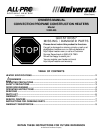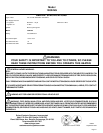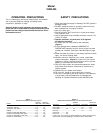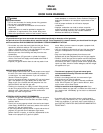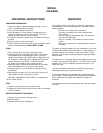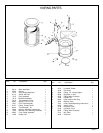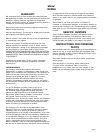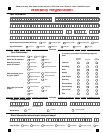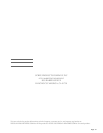
Page -3-
OPERATING PRECAUTIONS
This is a natural gas, direct-fired, radiant heater. It's intended
use is primarily temporary heating of buildings under
construction, alteration or repair.
When the heater is to be operated in the presence of other
people the user is responsible for properly acquainting those
present with the safety precautions and instructions, and of
the hazards involved.
Model
100R-NG
SAFETY PRECAUTIONS
1.Check the heater thoroughly for damage. DO NOT operate a
damaged heater.
2.DO NOT modify the heater or operate a heater which has
been modified from its original condition.
3.Use only natural gas.
4.Provide at least 5" W.C. but not over 1/2 psig to the heater
inlet (regulator inlet).
5.Use an appropriate hose or flexible connector not over 10 ft.
(3.05m) in length.
6.Operate the heater only with the 4" W.C.regulator
provided by the factory.
7.For indoor use only. Area must be well ventilated.
(Figure 1).
8.If at any time gas odor is detected, IMMEDIATELY
DISCONTINUE operation until the source of gas has been
located and corrected. (See Odor Fade Warnings on page
4.)
9.Install the heater such that is is not directly exposed to water
spray, rain and/or dripping water.
10.Maintain minimum clearance from normal combustible
material (like paper). (Figure 2). Locate 10 ft. from canvas
tarpaulins or similar coverings and secure them to prevent
flapping or movement due to wind action.
11.Due to the high surface and exhaust temperatures, adults
and children must observe clearances to avoid burns or
clothing ignition.
12. Operate only on a stable, level surface.
13.Do not move, handle or service while hot or burning.
14.Use only in accordance with local codes or, in the absence
of local codes, with the Standard for the Storage and
Handling of Liquefied Petroleum Gases ANSI/NFPA 58.
Figure 1
VENTILATION: Minimum openings required
Opening Opening
Heater near floor near ceiling
Infrared ...............................................................1 ft
2
.....................
1 ft
2
Convection (25-VC) ...........................................1 ft
2
.....................
1 ft
2
Convection (All others) ......................................2 ft
2
.....................
2 ft
2
Radiant................................................................ 2 ft
2
.....................
2 ft
2
Forced air (30K-125K BTU/HR)..........................1 ft
2
.....................
1 ft
2
Forced air (150-FAST, SPC-150T) ....................2 ft
2
.....................
2 ft
2
Forced air (3500-FACV, SPC-350).................... 3 ft
2
.....................
3 ft
2
Forced air (7000-FACV) .................................... 4 ft
2
.....................
4 ft
2
Figure 2
MINIMUM CLEARANCE: From normal combustible material
Radiant Forced Air
Clearance Infrared Convection Forced Air 7000-FACV
From floor ........................................................... 0 ft .............. 0 ft
From outlet .......................................................... 6 ft .............. 10 ft
From sides ................3 ft ............ 4 ft ...............2 ft .............. 3 ft
From top....................................... 6 ft ...............3 ft .............. 5 ft
From front .................6 ft
From rear ..................2 ft
Locate 10 ft. from canvas or plastic tarpaulins or similar coverings and
secure them to prevent flapping or movement due to wind action.



